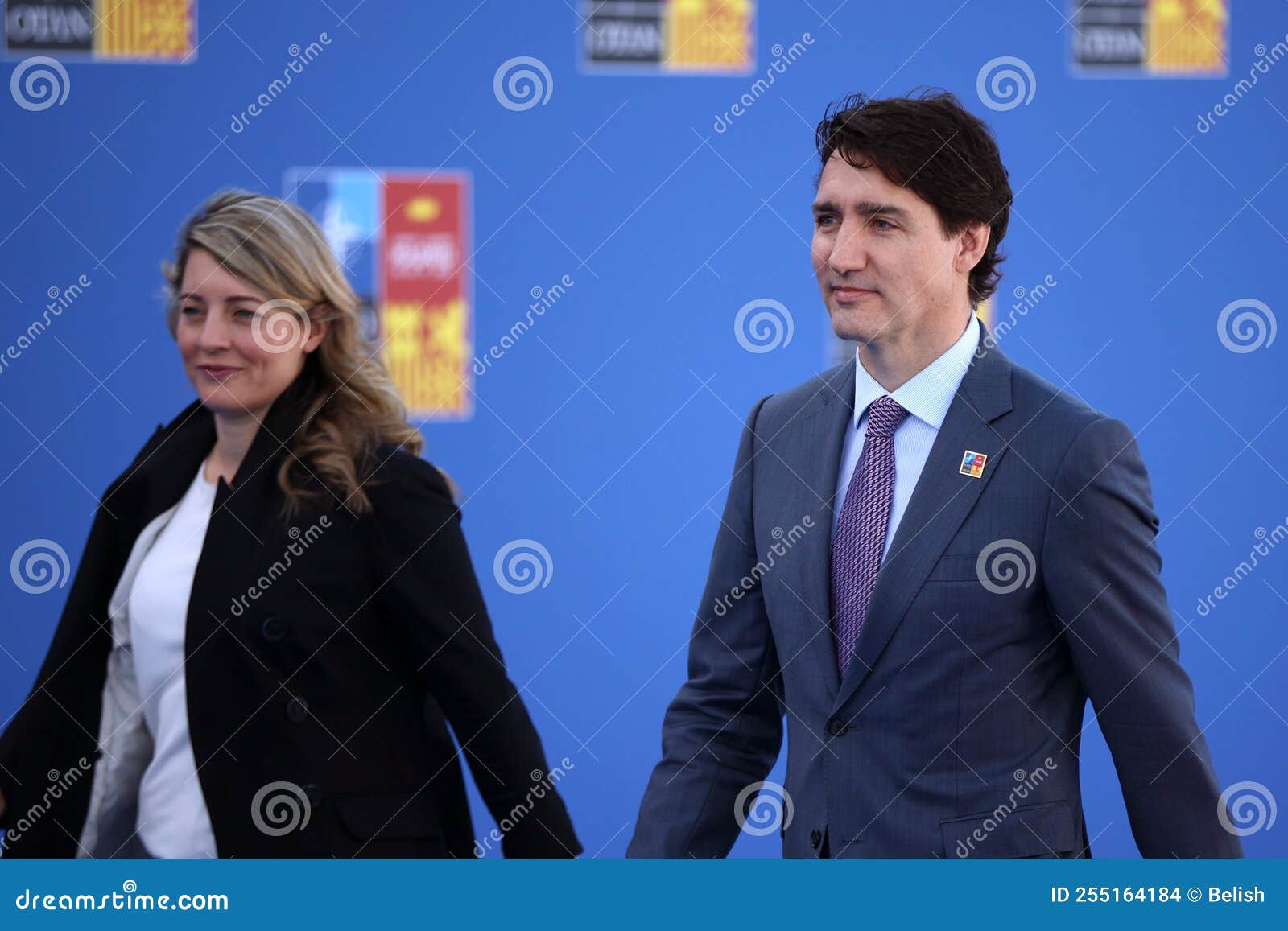Mélanie Joly and Justin Trudeau have become two of the most prominent figures in Canadian politics, each carving out a unique niche while working collaboratively to advance the nation's interests. Their political journeys, marked by dedication and innovative policymaking, have captured the attention of Canadians and international observers alike. With Joly’s expertise in cultural and digital innovation and Trudeau’s leadership as Prime Minister, their partnership has contributed significantly to shaping Canada’s modern identity. From addressing global challenges to championing local initiatives, their work continues to resonate across diverse communities.
Both leaders bring a wealth of experience to their roles. Mélanie Joly, known for her passion for arts and culture, has been instrumental in promoting Canadian heritage and fostering digital transformation. Her tenure in various ministerial roles has showcased her commitment to creating a more inclusive and connected Canada. Meanwhile, Justin Trudeau, as the leader of the Liberal Party and Canada’s Prime Minister, has championed progressive policies, focusing on climate action, social justice, and economic growth. Together, they embody a vision of leadership that emphasizes collaboration, innovation, and resilience.
As their influence grows, so does public curiosity about their personal and professional lives. Many are eager to learn more about how their backgrounds and experiences have shaped their leadership styles. From their early careers to their current roles, the stories of Mélanie Joly and Justin Trudeau offer valuable insights into the dynamics of modern governance. Their partnership serves as a testament to the power of teamwork in addressing the complex challenges facing Canada today.
Read also:The Ultimate Guide To Chester Koong Biography Achievements And Insights
Table of Contents
- Biography of Mélanie Joly
- What Are the Key Highlights of Justin Trudeau’s Leadership?
- How Has Mélanie Joly Contributed to Canada’s Cultural Landscape?
- What Are the Major Policies Shaping Mélanie Joly Justin Trudeau’s Legacy?
- How Do Their Roles Complement Each Other in Canadian Politics?
- What Challenges Have They Faced Together?
- How Are They Perceived by the Public and Media?
- What Does the Future Hold for Mélanie Joly Justin Trudeau?
Biography of Mélanie Joly
Mélanie Joly’s journey in public service is a testament to her dedication to creating a more inclusive and innovative Canada. Born on May 2, 1979, in Montreal, Quebec, Joly grew up in a bilingual household, which instilled in her a deep appreciation for Canada’s cultural diversity. Her academic journey took her to prestigious institutions, including the Université de Montréal and the London School of Economics, where she honed her skills in law and international relations. These formative experiences laid the groundwork for her future career in politics.
Joly’s political career began in earnest when she was elected as the Member of Parliament (MP) for Ahuntsic-Cartierville in 2015. Her charisma and commitment to public service quickly earned her a reputation as a rising star in Canadian politics. Over the years, she has held several key ministerial roles, including Minister of Canadian Heritage, Minister of Economic Development, and Minister of Foreign Affairs. Each position has allowed her to champion causes close to her heart, such as promoting Canadian culture, fostering digital innovation, and strengthening international relations.
To provide a comprehensive overview of her personal and professional life, here is a table summarizing key details:
| Full Name | Mélanie Joly |
|---|---|
| Date of Birth | May 2, 1979 |
| Place of Birth | Montreal, Quebec, Canada |
| Education | Université de Montréal (Law), London School of Economics (International Relations) |
| Political Affiliation | Liberal Party of Canada |
| Current Role | Minister of Foreign Affairs |
| Notable Achievements | Promoting Canadian culture, advancing digital innovation, strengthening international partnerships |
What Are the Key Highlights of Justin Trudeau’s Leadership?
Justin Trudeau’s leadership as Canada’s Prime Minister has been marked by a blend of progressive policies, bold decision-making, and a commitment to inclusivity. Since becoming the leader of the Liberal Party in 2013 and subsequently assuming the role of Prime Minister in 2015, Trudeau has positioned himself as a champion of social justice, environmental sustainability, and economic innovation. His leadership style is characterized by a willingness to engage with diverse perspectives, fostering collaboration both domestically and on the global stage.
One of the most notable aspects of Trudeau’s tenure has been his focus on climate action. Under his leadership, Canada has committed to ambitious targets for reducing greenhouse gas emissions, including a pledge to achieve net-zero emissions by 2050. The introduction of the Carbon Pricing Act and investments in renewable energy infrastructure have been pivotal in advancing this agenda. These efforts have not only positioned Canada as a leader in the global fight against climate change but have also spurred innovation in green technologies.
Trudeau has also prioritized social justice and equality. His government has implemented policies aimed at closing the gender wage gap, advancing Indigenous reconciliation, and supporting marginalized communities. For instance, the introduction of the Canada Child Benefit has helped lift thousands of families out of poverty, while investments in Indigenous education and healthcare have sought to address long-standing inequities. These initiatives underscore Trudeau’s vision of a Canada that is inclusive and equitable for all its citizens.
Read also:Exploring The Fascinating World Of Bme Pain Olympics A Deep Dive
On the international stage, Trudeau has been a vocal advocate for multilateralism and global cooperation. His leadership during the G7 and G20 summits has emphasized the importance of collective action in addressing global challenges, from pandemics to economic instability. Furthermore, his commitment to strengthening Canada’s relationships with allies, including the United States and European nations, has reinforced Canada’s role as a reliable partner in international affairs.
What Sets Justin Trudeau Apart as a Leader?
What sets Justin Trudeau apart as a leader is his ability to balance idealism with pragmatism. While he is known for his progressive vision, he has also demonstrated a willingness to adapt and evolve in response to changing circumstances. For example, during the COVID-19 pandemic, Trudeau’s government implemented measures to support businesses and individuals, showcasing his adaptability in times of crisis. This ability to navigate complex challenges while maintaining a clear sense of purpose has earned him both praise and scrutiny, but it remains a defining feature of his leadership.
How Has Mélanie Joly Contributed to Canada’s Cultural Landscape?
Mélanie Joly’s contributions to Canada’s cultural landscape have been nothing short of transformative. As Minister of Canadian Heritage, she played a pivotal role in shaping policies that celebrate and preserve Canada’s rich cultural heritage while fostering innovation in the arts and media sectors. Her initiatives have not only supported Canadian creators but have also positioned Canada as a global leader in cultural diplomacy. From championing the arts to advancing digital innovation, Joly’s work has left an indelible mark on the nation’s cultural identity.
One of Joly’s most significant achievements was the introduction of the Creative Canada Policy Framework. This comprehensive strategy aimed to support Canadian artists, creators, and cultural industries by ensuring they have the resources and platforms needed to thrive in a rapidly evolving digital landscape. The framework emphasized the importance of investing in Canadian content, promoting diversity in storytelling, and expanding access to arts and culture for all Canadians. Through these efforts, Joly has helped ensure that Canadian voices continue to resonate both domestically and internationally.
In addition to her focus on traditional arts and culture, Joly has been a staunch advocate for digital innovation. Recognizing the transformative power of technology, she spearheaded initiatives to support Canada’s digital economy, including investments in high-speed internet infrastructure and programs to foster digital literacy. Her work in this area has not only strengthened Canada’s position as a leader in the digital age but has also created new opportunities for creators to reach global audiences. By bridging the gap between culture and technology, Joly has laid the foundation for a more inclusive and dynamic cultural ecosystem.
How Has Mélanie Joly Advanced Indigenous Representation in the Arts?
A critical aspect of Joly’s tenure has been her commitment to advancing Indigenous representation in the arts. Recognizing the importance of amplifying Indigenous voices, she has championed policies that support Indigenous artists and storytellers. For example, her government has increased funding for Indigenous-led cultural initiatives and established partnerships with Indigenous organizations to promote cultural preservation and innovation. These efforts have not only celebrated Indigenous heritage but have also fostered greater understanding and reconciliation between Indigenous and non-Indigenous communities.
What Role Does Digital Innovation Play in Joly’s Cultural Strategy?
Digital innovation has been a cornerstone of Joly’s cultural strategy. By embracing new technologies, she has sought to modernize Canada’s cultural industries and ensure they remain competitive in a globalized world. Initiatives such as the Canada Media Fund and the Digital Citizen Initiative have provided creators with the tools and resources needed to thrive in the digital age. These programs have not only supported the production of high-quality Canadian content but have also empowered creators to experiment with new formats and platforms, ensuring that Canada’s cultural industries remain vibrant and resilient.
What Are the Major Policies Shaping Mélanie Joly Justin Trudeau’s Legacy?
The legacy of Mélanie Joly and Justin Trudeau is deeply intertwined with the policies they have championed during their time in office. Together, they have spearheaded initiatives that address some of the most pressing challenges facing Canada, from climate change and social justice to economic innovation and cultural preservation. Their collaborative efforts have not only shaped the nation’s trajectory but have also positioned Canada as a leader on the global stage. By examining their major policies, we can gain a clearer understanding of the impact they have had on Canadian society.
One of the cornerstones of their legacy is their commitment to environmental sustainability. Under Trudeau’s leadership, Canada has implemented some of the most ambitious climate policies in its history. The introduction of the Carbon Pricing Act, investments in renewable energy, and participation in international climate agreements have underscored Canada’s dedication to combating climate change. Joly, in her role as Minister of Economic Development, has complemented these efforts by promoting green technologies and supporting industries transitioning to a low-carbon economy. Together, their policies have not only reduced Canada’s carbon footprint but have also created new opportunities for innovation and job creation in the green sector.
Another key area of focus has been social justice and equality. Trudeau’s government has introduced policies aimed at closing the gender wage gap, advancing Indigenous reconciliation, and supporting marginalized communities. Programs such as the Canada Child Benefit and investments in affordable housing have helped reduce poverty and improve the quality of life for countless Canadians. Joly has played a crucial role in these efforts by championing initiatives that promote diversity and inclusion in the arts and media sectors. Her work has ensured that underrepresented voices are heard and celebrated, contributing to a more equitable and inclusive society.
What Role Does Economic Innovation Play in Their Policy Framework?
Economic innovation has been another pillar of their policy framework. Recognizing the importance of fostering a competitive and resilient economy, both leaders have prioritized investments in technology and digital infrastructure. Joly’s initiatives to expand high-speed internet access and support digital literacy have been instrumental in bridging the digital divide and ensuring that all Canadians can participate in the digital economy. Meanwhile, Trudeau’s focus on attracting global talent and fostering entrepreneurship has positioned Canada as a hub for innovation and economic growth. Together, their efforts have laid the groundwork for a prosperous and sustainable future.
How Do Their Roles Complement Each Other in Canadian Politics?
The partnership between Mélanie Joly and Justin Trudeau exemplifies the power of collaboration in achieving shared goals. While their roles differ in scope and focus, their complementary approaches have strengthened Canada’s governance and policy-making processes. Trudeau’s leadership as Prime Minister provides the overarching vision and direction for the nation, while Joly’s expertise in specific areas, such as culture and digital innovation, ensures that this vision is translated into actionable policies. Together, they form a dynamic duo that addresses both the big-picture challenges


